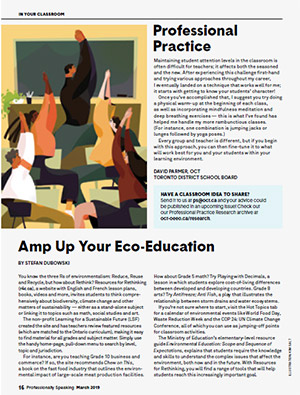Share this page
Professionally Speaking welcomes letters to the editor. We reserve the right to edit letters for length and to conform to our publication style. To be considered for publication, letters should be in response to an article or ad published in the magazine and include the writer’s daytime phone number and registration number. Address letters to: The Editor, Professionally Speaking at ps@oct.ca or 101 Bloor St. W., Toronto, ON M5S 0A1.

I am responding to the Professional Practice article in the March 2019 issue. I appreciate the ideas for helping students focus using exercise and breathing techniques. I am concerned, though, at the suggestion of yoga in the classroom.
Our country is multicultural and multi-faith. Society has started to include some faith-based practices with the suggestion there may be health benefits. Yoga is one of these faith-based practices. The foundations of yoga are in the Hindu faith and the poses pay homage to Hindu gods. Having students participate in yoga means they are taking part in religious practices of the Hindu faith. Some other faiths strictly forbid the practice of participating in activities of another faith. There was recently a case in the news where parents took an Ontario school board to task for allowing yoga to be taught in their child’s elementary school.
It would be prudent to be informed about faith-based practices and the possibility of inadvertently exposing students to practices that are not permitted in their faith. We simply need to “Google” the origins of any exercise or practice we are thinking of incorporating into our classrooms.
Valerie Downing, OCT, is a secondary and continuing education teacher with the Lambton Kent District School Board.

I’m writing in response to the article “Supporting Students’ Mental Health” in the March 2019 issue and the enclosed professional advisory.
As an elementary homeroom teacher, I am fully aware of the importance of recognizing students struggling with their mental health, and providing a supportive environment that allows those students to feel safe and able to learn. I am also increasingly aware of the same need to recognize and support the mental health of teachers working with these students. I was particularly interested in the section on page 4 of the advisory, which listed observable behaviours that could be signs for possible concerns. I can go down that same list and recognize behaviours frequently exhibited by many colleagues in the teaching profession. In order for us to meet the needs of our students, we too, need to be mentally well.
I am positive that I do not need to outline the mounting pressures and demands on teachers. However, there seems to be little, if any, focus given to the impact this is having on teachers’ mental health. The only attention to this important issue came on the last page of the advisory, asking teachers to be role models by maintaining their own wellness. I am wondering about the possibility of using your magazine to encourage teachers to make their own mental wellness a priority, and to feel the support of a self-regulatory body as influential as the Ontario College of Teachers.
Jon-David Rodway, OCT, is an elementary teacher with the Toronto District School Board and a registered psychotherapist with an active practice.
Editor’s Response: You’re absolutely right: Mental health is as important for teachers as it is for students. In our June 2016 issue we published an article called “Toward Wellness” that explored the subject and recommended resources and tools for support [oct-oeeo.ca/towardwellness]. Because this is such a critical topic, we plan to revisit it in the near future.